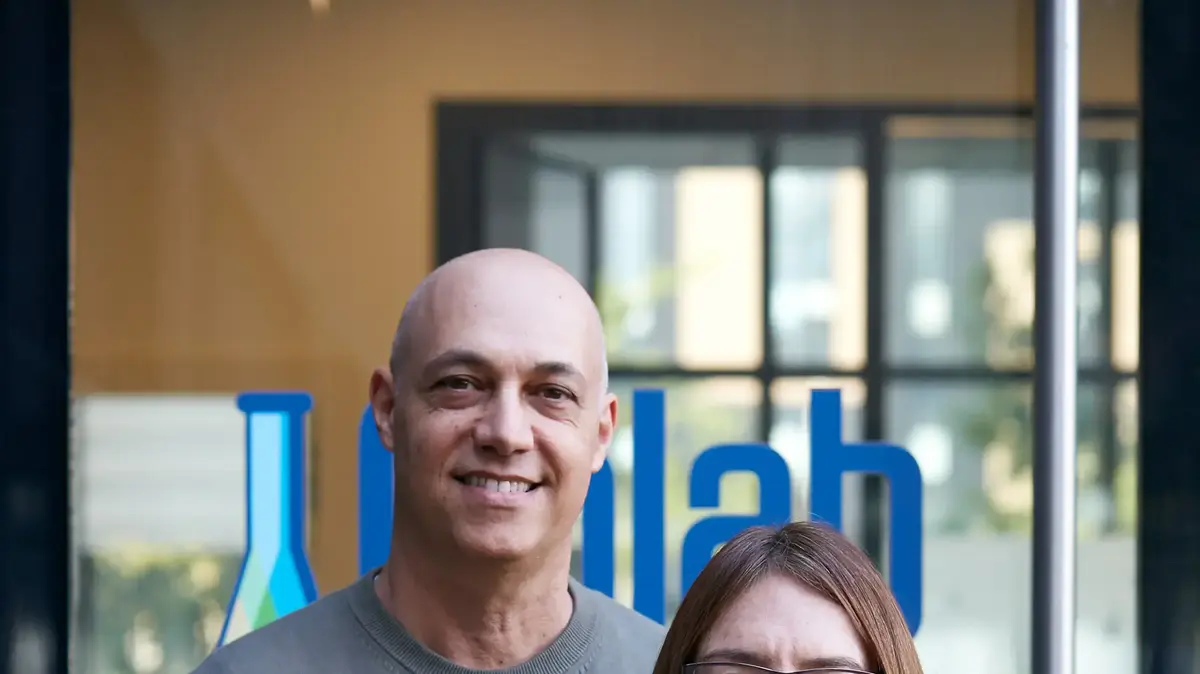Like some two crazy people: Dr. Salait Tsavan and Yaron Brightman, founders of Co-Lab Square (Photo: Samantha Kretzmer)
Although in 2022 startups in the life sciences sector raised about 2 billion dollars, they still make up only 2% of all startups in Israel.
The extensive knowledge accumulated in the development centers of Israeli and international companies operating in Israel and the Israeli academy from which the world's leading developments came out, were supposed to make Israel a global biotech powerhouse, so the big question is why this is not happening yet.
One of the reasons lies in the fact that establishing a start-up in the field of biotech, pharma-tech or claim-tech requires a large initial capital due to the need for advanced laboratories and expensive equipment.
The ability to raise money before the feasibility of making a profit has been proven, poses many entrepreneurs a problem since without money there is no development and without development there is no money.
Home effect and the hen.
Dr. Salait Tsavan and Yaron Brightman
Choose to sacrifice quite a bit in order to promote the field and meet its most immediate need - laboratories are available without obligation.
The two recognized the potential already in 2018, when they chose to leave the senior positions they held at Dimd and Business Webster, and establish the COLAB SQUER joint laboratories complex.
"Co-Love Square" is a home for young start-ups at the beginning of their journey, without taking a percentage of the company.
The complex was established by the two in Yokneam and it provides equipment worth millions of dollars, professional accompaniment and an initial introduction to the market, in exchange for fixed rents, which can be adjusted to the company's capital situation.
Yaron Breitman: "Relative to the general volatility, investments in biotech are more stable" (Photo: Samantha Kretzmer)
We pulled the houses
"The biotech industry in Israel is based on innovation that comes from academia and industry, and there is a long tradition of cooperation between the two," says Yaron Britman.
"This relationship is stronger compared to some of the other "tech" industries, for example cyber, fintech, and enables stability in the number of new companies and recruitments. Although pharma has the image of a high-risk investment, these are still companies whose problems they solve are acute and necessary."
Is there a connection between biotech and hi-tech?
"The volatility of biotech fundraising in Israel and around the world is subject to high-tech as a whole, therefore, even though the two billion shekels raised in biotech represent a 50% decrease compared to 2021, the relative share of biotech in the general investment in tech has increased from 11% to 13%, that is, in Relative to the general volatility, investments in biotech are more stable."
What is this stability?
"The stability we are talking about is also reflected in the following interesting way: we are in continuous contact with quite a few funds, and what we see and hear is that they make repeated investments in their portfolio companies. This is very different from other tech industries where large sums of money can be invested in startups In a short time, but continued investments may or may not come at all, suddenly and without sentiments. There is continuity in biotech. This is attractive to entrepreneurs who know they have a horizon, and may be another reason for the success of biotech in Israel."
Yaron Britman, 53 years old, lives in Tamar settlement, married +3, has a master's degree in cognitive psychology and years of experience in developing software and medical devices
.
Brittman previously served as director of project management at Business-Webster, was VP of marketing at MeMed and VP of program management at Philips-Medical.
As Vice President of Program Management at Philips-Medical, Britman led a group of directors, program managers and research and development projects in the ICAP division and served as a member of its global management. Dr. Salait Tsaban, 49 years old,
married +4, lives in Yishuv Nofit, holds a PhD in biology from the Hebrew University, a post-doctorate at Harvard and years of managing research and development in various biotech companies
in the north of the country.
In her last position, Tsavan was Research and Development Director at the MeMed company, and within this position she managed all the biological development activities of a device to separate between viral and bacterial infection.
"Both of us left comfortable and profitable, key and enriching jobs, but both of us had a burning desire to promote the field in a larger and broader way and at the same time we wanted to be independent and not depend on factors above us."
To realize the vision, the two invested all their business and personal money.
During the establishment period, they moved to live in the format of "bankruptcy" - they put in all their savings, sold their cars, mortgaged their house, and all with the full support of the families, who also became part of the investment out of a true belief in the goal - the advancement of development and research in the field.
More in Walla!
Pietro celebrates a round birthday and you enjoy a once-in-60-years sale
In collaboration with Pitro
Dr. Selait Tsavan: "The solution was to establish a laboratory complex that entrepreneurs can enter quickly and cheaply, based on resource sharing" (Photo: Samantha Kretzmer)
It's hard to imagine
"In the beginning, we had the idea of establishing our own start-up company. To develop the idea, we tried, without success, to find a laboratory where we could prove the technological feasibility," Tsavan recalls.
"The financial investment required to establish a new laboratory was high, office spaces such as WeWork do not have the necessary infrastructure, and neither academia nor large companies were ready to provide a solution without renouncing intellectual property on our part. We realized that this problem is more significant than the initial technological idea and that there is a need and an opportunity to
create change and contribute to the industry to which we belong. The solution was to establish a laboratory complex that entrepreneurs can enter quickly and cheaply, based on sharing resources. We met with other entrepreneurs and realized that the problem was widespread and that the solution we proposed was acceptable. What we lacked were an innovative business model, a definition of added value and financial resources . We felt that we had the technical and mental maturity, a willingness to sacrifice and, in hindsight, a dash of stupidity as well. We went with it."
"First of all, this is the field we come from and know it well. We are both development professionals with a lot of experience and are intimately familiar with the needs of biotech. We have a lot to contribute and companies come to us because of this as well. Our age also allows us the breathing space to invest for the long term. Second, we come from parallel fields of technology, and together we predict that the convergence of a number of promising and parallel technologies is going to bring the field of life sciences to areas that are difficult for us to even imagine.
Although we are part of this group ourselves, our significant and main task is to be a force multiplier for the entire community of scientists and entrepreneurs who are making this revolution, and that What is at the center of our vision. Amazing companies with world-class developments are expected to emerge from here, we will be there when it happens, on this speeding locomotive, and we will contribute in any way we can." How did the families react to the "bankruptcy format"
?
Britman: "Behind every successful entrepreneur is a supportive family, and our two families accepted the matter naturally. Our spouses, past and present husbands in high-tech, agreed to our craziness and together with us form the company's board of directors. It is necessary, fun and works for us. In fact, the establishment of a co- Love Square gave the children a personal example in believing in the path, in thinking ahead, in totality, in being ready to pay a price and in taking calculated risks. The children, for their part, rallied to the task and helped as much as they could and by volunteering."
What was your daily life like?
"Some of the vehicles were replaced with old ones, and some just stayed like that. We stopped traveling abroad, we didn't eat out, we had to fire the gardener and the assistant, and from the last of the children to the grandparents - everyone volunteered and participated.
We did not feel poor.
There was a lot of energy, creative joy and an atmosphere of partnership.
We were a little surprised that the decline in the standard of living had no effect on the quality of life.
Looking back, it was a difficult, but wonderful time."
What is the initial capital required to establish a start-up in the field of biotech in Israel today?
"It varies, depending on the field, technology and market. A cell-based idea in the pharmaceutical field, which requires a laboratory infrastructure, will be more expensive. A company that needs a laboratory will need no less than NIS 1-2 million to build a laboratory, order equipment and meet standards, even before salaries and purchasing materials. On the other hand, a foodtech company that does not necessarily need laboratory infrastructure can start with only a few hundred thousand shekels."
"A company that needs a laboratory will need no less than NIS 1-2 million to build a laboratory, order equipment and meet standards, even before salaries and buying materials" (Photo: Samantha Kretzmer)
Against all odds
Assuming the potential is so great, why doesn't it get to raise billions like other tech industries?
Tsavan: "The field of life sciences is very broad and includes within it the fields of food and agriculture, climate, energy, pharma and diagnostics. It is a field that poses first challenges at the top and yields second-life developments, but at the same time, it is complex and fraught with risks. Because of this, the field of life sciences It is the opposite: breakthrough innovation in everything related to ideas and technologies, together with process conservatism, especially in aspects related to product safety.
Due to all these, the entry threshold into the field of life sciences is very high, which reduces the number of major players in this market compared to other markets.
On the other hand, the profits from the investments in the field will usually be on a large and stable scale, which requires investors with understanding, and the patience to look years ahead.
For example, the development of a new drug until its marketing will take at least 15 years, a very long period of time in terms of investments.
In today's global uncertainty and recession - such investors are rare, especially in Israel."
I assume that not only "there is heaven" and the advancement of the field is before your eyes. Do you think that the investment and sacrifice will pay off for you?
Britman: "We hope... the logic of cooperatives makes it profitable for everyone. It is important to understand that a laboratory infrastructure that includes the equipment and safety permits that are required is very expensive. It involves costs of millions of shekels. Therefore, establishing such an infrastructure for the exclusive use of one company is an unwise use of investors' money We see that when the option exists, the entrepreneurs choose to start in a joint complex. The investors are also satisfied, since their money starts working on research and development immediately. In addition, today we have early exposure to new technologies and ideas even before they mature. Beyond the pleasure and satisfaction we get from donating to young entrepreneurs, We also receive opportunities for investment that in the future will be able to pay off financially."
About twenty startups of twenty companies from a variety of fields are currently operating in Britman and Tsavan's incubator.
"In total, over 30 companies have passed through our laboratories," says Tsavan.
In the medical field, you can find the EFA company that develops a compact and portable device for rapid blood counts, the CYTORA company that develops treatment for diabetic wounds and MSA based on unique stem cells, the Barcode Nano and ExoProTher companies that develop drugs against cancer and other diseases, PhenoFast that develops a unique solution in the field The antibiotic and the VESSL company that develops solutions for the regeneration of blood vessels.
In the fields of climate and the environment there are the company Biotic which develops biodegradable biological plastic, the company Gigaton which develops a solution for carbon fixation, SolOr which produces solar paint and more.
In the field of food, Else Nutrition develops alternative food for vegan babies or those allergic to milk and soy.
"Since we have been operating, the companies we have raised independently, in a total amount of about NIS 275 million, in addition to the companies that matured and left and raised about 70 million additional NIS," Tsavan boasts.
Co-Love Square's first complex opened in K'neam exactly two months before the outbreak of the Corona epidemic, which made the process even more difficult.
In 2022, a second complex will open in Caesarea.
"We were able to open another complex because we grew faster than the market, and there are at least three possible reasons for this," explains Tsavan.
"The first is a significant increase in the volume of activity of our companies. The second is that through networking we were able to reach more new companies. The third is market education. Companies have learned that starting in a joint complex is more economical and immediate. The field of biotech is very broad and almost never-ending. Compared to the world, In Boston, for example, there are four times more areas of shared laboratory complexes in relation to the number of companies - than in Israel. Therefore, we believe that there is still room for striving."
What will be next?
"As for the future, it is difficult to predict, but we hope that with the help of our complexes, we will lower the entry threshold for establishing biotech companies and thus help the field to grow. At least for us, at the end of 2022 and the beginning of 2023 we have absorbed five new companies and more are on the way. Moreover, in today's markets where inflation, volatility and storms "The politics undermine the stability of the entire high-tech sector, our role is sharpened. We are attentive to the changing capabilities and needs, so the meaning of the flexibility we provide is that a company can adjust the volume of its activity to its capabilities, be efficient and thus weather the storm."
"We hope that with the help of our complexes we lower the entry threshold for establishing biotech companies and thus help the field to grow" (Photo: Samantha Kretzmer)
Of money
Tags
bio technology
start up
High tech















